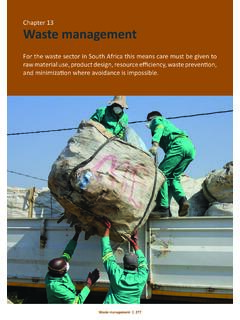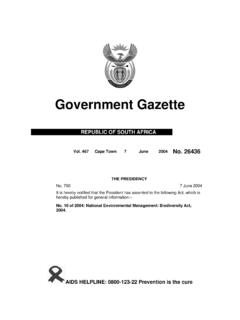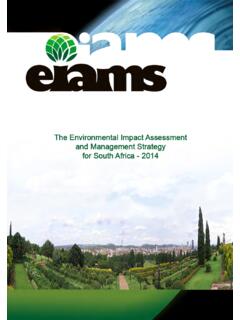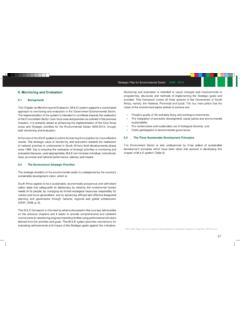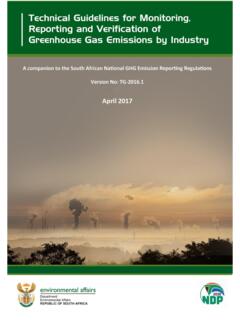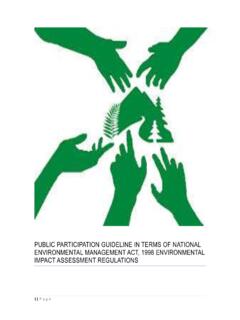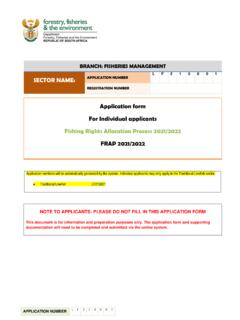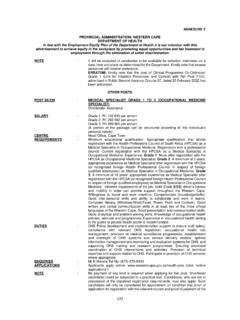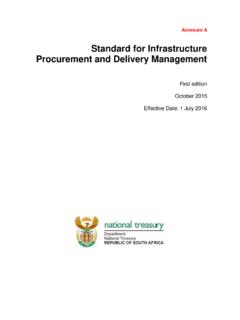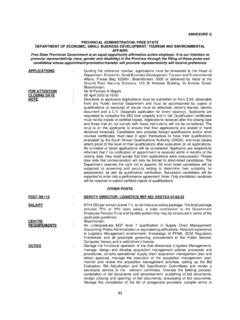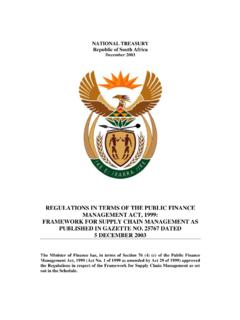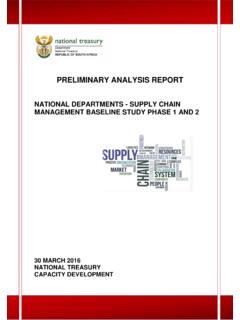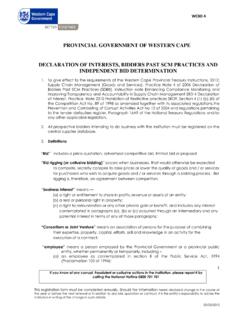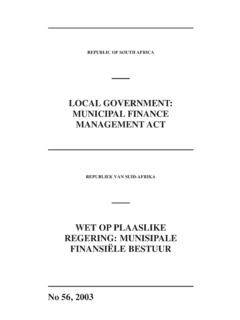Transcription of SUPPLY CHAIN MANAGEMENT POLICY - Department of …
1 Environmental affairs Department : Environmental Affairs REPUBLIC OF SOUTH AFRICA SUPPLY CHAIN MANAGEMENT POLICY INDEX TO SCM POLICY PARAGRAPH PAGE CONTENT NO NO 1 Background 3 2 Glossary 4 3 Introduction 7 4 Elements of SCM 8 Demand MANAGEMENT Acquisition MANAGEMENT Logistics MANAGEMENT 9-12 Disposal MANAGEMENT SUPPLY CHAIN Performance Risk MANAGEMENT 6 Separation of duties 13 7 SCM POLICY Objectives 13 8 General conditions for procurement of goods and services 14 9 Black Economic Empowerment (BEE) 17 10 Responsibilities 18 11 Values and code of conduct 18-19 12 Bid Administration 20 13 POLICY on Acquisition of goods and services by price 21 quotations 14 Accommodation and Conferences 21 15 Bid Evaluation method 21-23 16 Exceptions to the bidding process 24 17 Accepting a Bid 24 18 Appointment of consultants 25-26 19 Consultant Bid Evaluation 26 20 Establishing of a list of prospective Service Providers 27 21 Declarations of interest by the bidder (see attached annexure 5 27 and 6) 2 PARAGRAPH PAGE CONTENT NO NO 22 Late Bids 27 23 Payment of Supplier's accounts 28 24 Deviations from normal policies and procedures 28 Approval 28 1.
2 BACKGROUND Constitutional Section 217 of the Constitution of the Republic of South Africa, 1996 (Act No. 108 of requirements 1996). requires an organ of state to contract for goods or services in accordance with a system that is: Fair Equitable Transparent Competitive, and Cost effective. NATIONAL LEGISLATION PRESCRIPTS AND GUIDES ON WHICH POLICY IS BASED Legislation that This procurement POLICY is in support of the following legislation, regulations and underpins SCM guidelines: The Public Finance MANAGEMENT Act, 1999 (Act No. 1 of 1999) (PFMA] Treasury Regulations: SCM Chapter 16A The Framework for SUPPLY CHAIN MANAGEMENT dated December 2003, issued by National Treasury National Treasury's SUPPLY CHAIN MANAGEMENT Guide for Accounting Authorities, dated February 2004 The POLICY Strategy to guide uniformity in Procurement Reform Process in Government, dated July 2003 The Broad-Based Black Economic Empowerment Act, (Act No.))
3 53 of 2003), and its codes of good practice as promulgated on 9 February 2007 The Preferential Procurement POLICY Framework Act, 2000 (Act No. 5 of 2000) Promotion of Access to Information Act, 2000 (Act No. 2 of 2000) '~ Director-Gene ra l 3 This purpose of this POLICY The purpose of this POLICY on SUPPLY CHAIN MANAGEMENT (SCM) is to give effect to the five pillars of procurement, it must be fair, equitable, transparent, competitive and cost effective, as well as to give effect to the enabling legislation, regulations and strategies to modernise procurement, provisioning and related functions. 2. GLOSSARY Introduction The following terms and explanations apply in this POLICY : Term Explanation Acceptable bid Any bid that complies in all respects with the specification and conditions set out in the procurement document DEA Department of Environmental Affairs BBBEE Act Broad Based Black Economic Empowerment Act, 2003 (Act No.
4 53 of 2003) Bid (or tender) A written offer in a prescribed form in response to an invitation by the Department of Environmental Affairs for the provision of services, works or goods Departmental Adjudication The Departmental Adjudication Committee that is responsible committee (DAC) for adjudicating the award of bids Bid evaluation committee Committees approved by the respective DOGs that are responsible for assessing bids with a view to submitting a recommendation or evaluation report to the Departmental Adjudicating Committees for the award of the contract to the preferred bidder Goods and services Goods to be included in goods and services (petrol, coal, small tools and equipment, stationery, foodstuff and electricity, services will include hotels, restaurant, transport, communication, banking, business services, consultants' fees, market research and staff training, as well as rental of buildings, other fixed structures, equipment and vehicles.
5 Payments for research, design costs, bursaries to government employees and consultants' fees are also considered purchases of services and as such are classified under goods and services. ~\ .~~:'\ 1'-" ll) Director-Gene ra l 4 Term Explanation HOI A "Historically Disadvantaged Individual" is a South African citizen who: 1. Because of the apartheid POLICY that was in place, had no franchise in national elections prior to the introduction of the Constitution of the Republic of South Africa,1983, or the Constitution of the Republic of South Africa,1993, and/ or 2. Is a female, and/ or 3. Has a disability-, provided that a person who obtained South African citizenship on or after the coming into effect of the Interim Constitution, is deemed not to be an HOI. Organ of State Any Department of state or administration in the national, provincial or local sphere of government, or Any other functionary or institution exercising a: 0 power or performing a function in terms of the Constitution or a provincial institution, or 0 public power or performing a public function in terms of any legislation, but does not include a court or a judicial officer.
6 PFMA The Public Finance MANAGEMENT Act, 1999 (Act No. 1 of 1999), as amended by Act No. 29 of 1999 PPPFA The Preferential Procurement POLICY Framework Act, 2000 (Act No. 5 of 2000), which regulates preference points to HDis Bid documents The bid documents are all SBD forms and TORs to be distributed to prospective bidders during the Department of Environmental Affairs' solicitation of bids from bidders. These documents contain the information required for bidders to submit their bids to the Department Substantial Bidder to submit all documents and information as per the criteria Urgent cases Are where early delivery is of critical importance and the invitation of competitive bids is either impossible or impractical Emergency cases Are where immediate action is necessary in order to avoid a dangerous or risky situation.
7 SCM regulations Regulations in terms of the Public Finance MANAGEMENT Act, 1999: Framework for SUPPLY CHAIN MANAGEMENT (Government Gazette Number 25767 of 5 December 2003) C .l1~Y~~ .. '.':'. ~.':: u .. -:--:. D irector-Genera I 5 Term Explanation SCM unit The Department of Environmental Affairs' SUPPLY CHAIN MANAGEMENT unit that falls under the auspices of the Chief Financial Officer (CFO), as per Treasury Regulation 16A4 Scoring models The models used to evaluate bids. Scoring models apply the evaluation criteria identified in the Procurement Documents to competing bids Supplier register The Department 's database of suppliers Treasury National Treasury Accounting Officer The head of the Department of Environmental Affairs DOG Deputy Director-General CFO Chief Financial Officer coo Chief Operating Officer Director-General 6 3.
8 INTRODUCTION What is SCM? Definition SUPPLY CHAIN MANAGEMENT is an integrated part of financial MANAGEMENT , intended to introduce international best practices. SCM is a collaborative strategy to integrate procurement and provisioning processes so as to eliminate non-value added cost, infrastructure, time and activities in a way that will serve end users better and more competitively. Key aspects include integrated planning of operations, tactics and strategies. Director-Gene ra l 7 4. ELEMENTS OF SCM SCM comprises the following elements: 1. Demand MANAGEMENT This is the beginning of the SUPPLY CHAIN where: A need assessment to ensure that goods or services are acquired in order to deliver the agreed service is done; Specifications are precisely determined; Requirements are linked to the budget; and The supplying industries have been analysed.
9 2. Acquisition MANAGEMENT (procurement) This is almost all the focus of procurement activities including: Which market will be approached; Establishing the total cost of ownership of a particular type of asset; Ensuring complete bid documentation including evaluation criteria; Evaluating bids in accordance with published criteria; and Ensuring that proper contract documents are signed. 3. Logistics MANAGEMENT This aspect addresses the following: Setting of inventory levels. Receiving and distribution of materials. Stores, warehouse and transport MANAGEMENT . and Review of vendor performance. 4. Disposal MANAGEMENT At this stage consideration should be given to: Obsolescence planning; Maintaining a database of redundant material; Inspecting material for re-use; Determining a disposal strategy; and Executing the physical disposal process.
10 Director-General 8 5. SUPPLY CHAIN performance This is the monitoring process, undertaking a retrospective analysis to determine whether proper processes have been followed and whether the desired objectives were achieved. 6. Risk MANAGEMENT Risk in the case of SCM will include ensuring on a case by case basis that risks such as price or currency fluctuations are allocated to the appropriate party in unambiguous contract documents or that guarantees or insurance arrangements are in place. Each is discussed in greater detail below. DEMAND This is the beginning of the SUPPLY CHAIN where the following happens: MANAGEMENT Stage . Entity Action responsibility/Duty responsibility 1 Branch Performs a needs assessment to ensure that goods MANAGEMENT or services are acquired in order to deliver agreed SCM Unit services 2 Branch Mgt Determines specifications precisely SCM Unit 3 Branch Links requirements to ensure that funds are Mgt/Finance available SCM Unit 4 Branch Mgt Analyses the supplying industry SCM Unit The outcome from this stage is that value for money is achieved.
